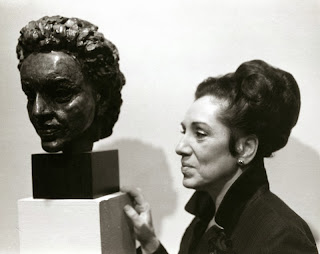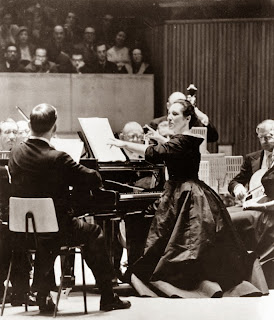She started her keyboard studies on the piano in Chicago, where she was in high school with the novelist Saul Bellow. She went on to study at the Juilliard School in New York, where her class mates included Jorge Bolet and Earl Wild. Tureck later taught at the Juilliard as well as at the Mannes School of Music, Columbia University and the University of Maryland. In 1970 she was made a life fellow of St. Hilda's College, Oxford and in 1973 became a visiting fellow of Wolfson College Oxford. If you mention Tureck's name to someone of a certain age from the UK, then it this period when she was living in Oxford for which she is remembered most.
But Tureck was not only a performer, she was also involved in the scholarly aspect of music, doing research into Bach's music and producing her own editions (something else which we take for granted). She founded a number of research institutes, their successor being the Tureck Bach Research Institute which makes grants and awards for research and performance of the music of Bach as well as promoting the publication of Tureck's writings.
But it is important to remember that Tureck performed far more than Bach, even though his music was central to her life. She had a wide repertoire ranging from Beethoven, Brahms and Chopin, through to David Diamond, Luigi Dallapiccola and William Schumann. One of her pupils, Michael Charry, remembers hearing her in recital in 1945 when she played Bach, Mozart, Beethoven, Copland and Brahms and talks of her working with focus and seriousness, seeking to play faithfully all the music that she played.
 |
| Rosalyn Tureck with bust of herself by Sir Jacob Epstein, Museum of Modern Art, New York (1966) |
When she started to gain respect, it was in Europe that it first happened. But it wasn't without problems. Another student Sharon Isbin recalls Tureck telling her of an incident which happened in the 1950's when Tureck was working with the Philharmonia Orchestra, at the time an all male ensemble. Having a woman playing one of Bach's Brandenburg Concertos caused tension, particularly when Tureck spent a lot of time working on ornamentation with the flautist. Eventually the orchestra's leader enquired why Tureck was spending so much time with the flautist and not him. You could have cut the air with a knife, but Tureck's response, 'truth be told, I prefer blonds' disarmed the situation.
And it was in Europe that she had her great Indian Summer. At the age of 86 she was persuaded back into the studio to record the Goldberg Variations, a work she had first recorded in 1958. Kevin Kleinman, vice-president of Polygram in 1997, talks about getting to know her in Oxford and the idea for the recording developed out of their friendship. His description of her just about sums up the image that Tureck had created; a big personality with an aura of charisma from a mile away. In Kleinman's view there were few who were scholars and performers at the level she was.
That there was another side to Tureck is testified by Miriam Karch. When Tureck and her husband moved to New York City in the 1940's Tureck offered Karch a room in the house and their relationship developed when Tureck and her husband parted. Karch's responsibilities gradually developed to such activities as editing Bach lectures and checking with Tureck's manager. But Karch emphasises that the Rosalyn Tureck of this period was nothing like her public persona of a grand dame, But there was a determination about her, she was going to be who she became.
Teri Noel Towe, who was a friend of Tureck's for 30 years, recalled that she was committed and driven, but asked no more of anyone than she would ask of herself, and always said please and thank you. But she also liked a laugh, he recalled taking her to one of Peter Schickele's PDQ Bach performance, and her loving it so much she insisted on being taken back stage to meet Schickele. But, Towe emphasises, none of this comes over in performance, once on stage she was intensely serious.
The recollections that I have been quoting in this article all come from a series of interviews recorded for the Tureck Bach Research Institute by surviving friends and colleagues of Tureck's. What comes over in all of them is not only Tureck's strength of personality, but also her ability to inspire love in those around her. She was someone who was intensely interested in you, and who would provide generosity, appreciation and emotional support.
As a performer Tureck expected the listener to meet her at the same level, to invest as much energy and commitment as she did. Whilst many aspects of her personality are difficult to capture with the passage of time, the sheer strength and power of her performances are audible from her recordings. There are a number of selections of Tureck's Bach recordings on the Tureck Bach Research Institute Site including The Well-Tempered Clavier
It is interesting to scan over recent reviews of her recordings to realise that the power and immediacy of her playing remain undimmed.
'Tureck’s absolute command of contrapuntal lines'
'Her tempi are consistently measured and one must acknowledge that throughout these performances one is in the presence of a musician of overwhelming digital and spiritual identification with her material.'
'The English Suite reflects many of the qualities that animate her playing of the selection from the Preludes and Fugues; the articulation, the rise and fall and accenting of the Allemande, the stabbing (but always rounded) attacks in the Courante and her stentorian, almost senatorially measured, Gavotte I.'
Jonathan Woolf on MusicWeb-International.com
'This is one of the finest piano recordings of the first book of the Well-Tempered Clavier available.'
'In general, the tempi here are more rapid. This set clocks in at some twenty minutes shorter than the 1953 set. Yet some of the key fugues are played much more slowly.'
'She plays this final fugue with such heart-rending beauty that the silence that follows after the disc is finished still sounds like Bach.'
Kirk McElhearn on MusicWeb-International.com
The record company VAI is releasing discs in celebration of the centenary
In honor of Rosalyn Tureck's 100th anniversary (1913-2013)
The latest two discs to be released are:-
VAIA1277 - 089948127727
J.S. Bach - Partitas, Volume 2: Partitas 3,4, 5 (BMV 827-829)
Rosalyn Tureck, piano
Recorded 1984, Stereo, 79 minutes
VAIA 1278-2 (2CD set) - 0899484127826
J.S. Bach - The Complete Partitas BWV 825-830
Rosalyn Tureck, piano
Recorded 1984, Stereo, 154 min.
These join an impressive selection of Tureck's recordings (both CD's and DVD's), including a 1995 all-Bach recital from Russia, as well as a lecture she gave on Bach ornamentation in 2002; see the VAI website for full details.
Elsewhere on this blog:- Fluid and fluent - English Touring Opera's Jason
- Intensely erotic - English Touring Opera's Coronation of Poppea
- Style and drama - Aci, galatea et polifemo - CD review
- Vocal style, visual mess - English Touring Opera's Agrippina
- WNO Tudor trilogy: Roberto Devereux
- WNO Tudor trilogy: Maria Stuarda
- WNO Tudor trilogy: Anna Bolena
- Win tickets to hear Roderick Williams in recital
- Planet Hugill in Hamburg: Sven Helbig and the Faure Quartett
- L'Orfeo at the Barbican with John Mark Ainsley and the Academy of Ancient Music
- Home


.jpg)









No comments:
Post a Comment